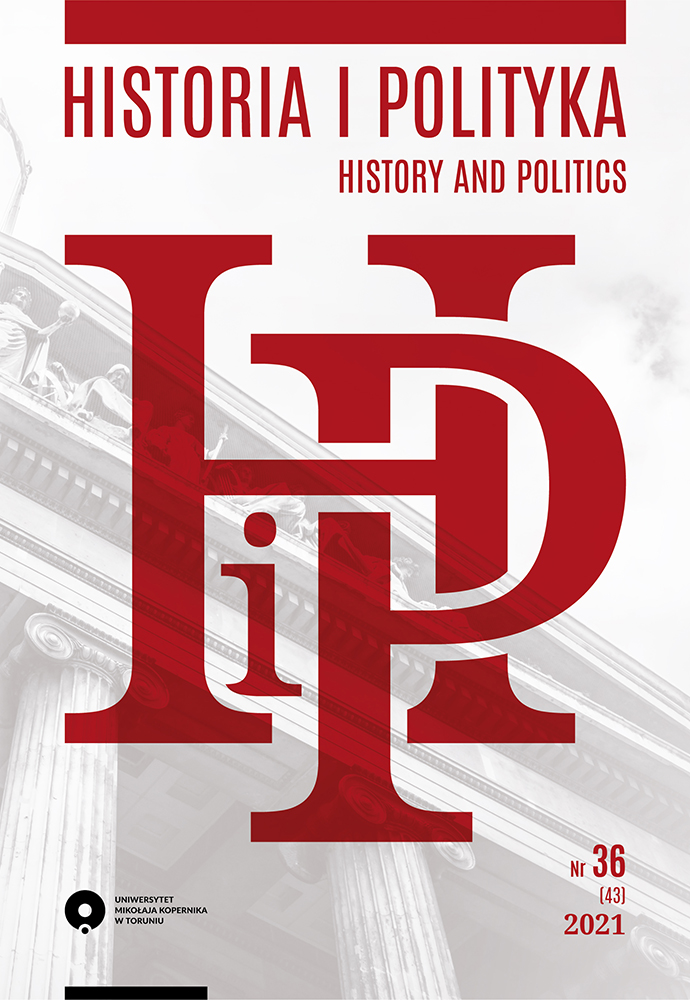The Issues of Democratization in Relations between Turkey and the USA in the Post-War Period
DOI:
https://doi.org/10.12775/HiP.2021.019Słowa kluczowe
modern Turkey, Turkeu-US politics, democratizationAbstrakt
At the end of the 20th century and in the first decade of the 21st century, the relations between Turkey and the United States of America attracted the attention of the international community. Since the end of the Cold War, the relationship between the Republic of Turkey and the United States has been mainly focused on security. The foreign policy of the two countries, from time to time, was conducted at counterpurposes. Parallel to this, the periods of ups and downs in political relations had an impact on economic relations as well. It was the matter of security that determined the acceptance of mutual cooperation between the two countries. On the one side stood the USA – one of the leaders of the Western bloc in the Cold War, and on the other Turkey – a state very important in its region, but the most dependent on the US. Despite being in the NATO bloc together with the USA, Turkey has never felt secure itself. Assessing Ankara’s domestic and foreign policy, it is necessary to take into account the relationship with the United States, as it had the biggest impact on the overall shape of Turkey’s policy. Although the real and potential power of these two countries was not equal, during the Cold War Turkey became a stronghold of NATO and the Western bloc against the Soviet Union. Turkey was one of the countries that appeared on the border between the eastern and western hemispheres. Perhaps due to the peculiarities of its geographical location, Turkey became a country with equally special role in the world politics. The relations with the United States evolved precisely in this direction.
Bibliografia
Davutoğlu, A. (2012). Principles of Turkish Foreign Policy and Regional Political Structuring. SAM (Stratejik Arastirmalar Merkezi) Vision Papers, Vol. 3. Ankara: Republic of Turkey Ministry of Foreign Affairs Center for Strategic Research.
Gentleson, B. (2015). US Foreign Policy – Dynamics of Choice in the 21st Century. Tbilisi (in Georgian).
Grigalashvili, S. (2009). Turkey in Modern Regional Politics. Tbilisi (in Georgian).
Kupreishvili, T. (2016). West European Union Policy. Tbilisi (in Georgian).
Obama, B. (2010). Barack Obama’s Foreign Policy: “Smart Power” or Idealism. Retrieved from: http://nasrashvili.blogspot.com/2010/06/blog-post.html (in Turkish).
Oran, B., Dayioğlu, A., Keskin, F., Ata, K. et al. (Eds.) (2013). Türk Diş Politikasi: Kurtuluş Savaşindan Bugüne Olgular, Belgeler, Yorumlar. Vol. 3: 2001–2012. Ankara: İletişim Yayınları (in Turkish).
Özel, S., Yilmaz, S., & Akyüz, A. (2009). Rebuilding a Partnership: Turkish-American Relations for a New Era: A Turkish Perspective. TÜSİAD Publication No-T/2009-04/490). Istanbul.
Turkish Foreign Policy 1990–2008 (2014). Translated from Turkish by M. Manchkhashvili. Tbilisi (in Georgian).
Uzgel, İ. (2001). ABD ve NATO’yla İlişkiler. In: B. Oran et al. (Eds.). Türk Dış Politikası: Kurtuluş Savaşından Bugüne Olgular, Belgeler, Yorumlar. Vol. 2: 1980–2001 (pp. 243–325). Ankara: İletişim Yayınları (in Turkish).
Pobrania
Opublikowane
Jak cytować
Numer
Dział
Licencja
Prawa autorskie (c) 2021 Beka Makaradze

Utwór dostępny jest na licencji Creative Commons Uznanie autorstwa – Bez utworów zależnych 4.0 Międzynarodowe.
Uniwersytet Mikołaja Kopernika w Toruniu respektuje prawo do prywatności i ochrony danych osobowych autorów.
Dane autorów nie są wykorzystywane w celach handlowych i marketingowych. Redaktorzy i recenzenci są zobowiązani do zachowania w poufności wszelkich informacji związanych ze złożonymi do redakcji tekstami.
Autor, zgłaszając swój tekst wyraża zgodę na wszystkie warunki i zapisy umowy licencyjnej (określającej prawa autorskie) z Uniwersytetem Mikołaja Kopernika w Toruniu.
Statystyki
Liczba wyświetleń i pobrań: 676
Liczba cytowań: 0



